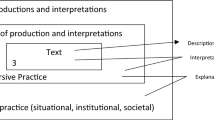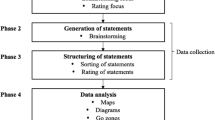Abstract
This study examined the Swedish national tests in chemistry for implicit and explicit values. The chemistry subject is understudied compared to biology and physics and students view chemistry as their least interesting science subject. The Swedish national science assessments aim to support equitable and fair evaluation of students, to concretize the goals in the chemistry syllabus and to increase student achievement. Discourse and multimodal analyses, based on feminist and critical didactic theories, were used to examine the test’s norms and values. The results revealed that the chemistry discourse presented in the tests showed a traditional view of science from the topics discussed (for example, oil and metal), in the way women, men and youth are portrayed, and how their science interests are highlighted or neglected. An elitist view of science emerges from the test, with distinct gender and age biases. Students could interpret these biases as a message that only “the right type” of person may come into the chemistry epistemological community, that is, into this special sociocultural group that harbours a common view about this knowledge. This perspective may have an impact on students’ achievement and thereby prevent support for an equitable and fair evaluation. Understanding the underlying evaluative meanings that come with science teaching is a question of democracy since it may affect students’ feelings of inclusion or exclusion. The norms and values harboured in the tests will also affect teaching since the teachers are given examples of how the goals in the syllabus can be concretized.









Similar content being viewed by others
References
Almqvist, J., & Lundqvist, E. (2013). De nationella provens innehåll: vilken scientific literacy mäts i NO-proven? In E. Lundqvist, R. Säljö, & L. Östman (Eds.), Scientific literacy—Teori och praktik (pp. 101–117). Malmö: Gleerups förlag.
Andersson, K. (2011). Lärare för förändring—att synligöra och utmana föreställningar om naturvetenskap och genus. (Doctoral dissertation, Linköping University, Department of Social Welfare Studies).
Archer, L., Dewitt, J., Osborne, J., Dillon, J., Willis, B., & Wong, B. (2010). “Doing” science versus “being” a scientist: Examining 10/11-year-old school children’s constructions of science through the lens of identity. Science Education, 94, 617–639. doi:10.1002/sce.20399.
Barton, A. (1998). Feminist science education. New York: Teachers College Press.
Berge, B.-M., & Widding G. (2006). En granskning av hur kön framställs i ett urval av läroböcker. Underlagsrapport till Skolverkets rapport”I enlighet med skolans värdegrund?”. Umeå universitet.
Björkvall, A. (2009). Den visuella texten: multimodal analys i praktiken. Stockholm: Hallgren & Fallgren.
Brickhouse, N. (2001). Embodying science: A feminist perspective on learning. Journal of Research in Science Teaching, 38, 282–295. doi:10.1002/1098-2736(200103)38:3<282:AID-TEA1006>3.0.CO;2-0.
Dufour, H., & Carroll, S. (2013). Great myths die hard. Nature, 502, 32–33. doi:10.1038/502032a.
Englund, T. (1997a). Undervisning som meningserbjudanden. In M. Uljens (Ed.), Didaktik: teori, reflektion och praktik (pp. 120–145). Lund: Studentlitteratur.
Englund, T. (1997b). Towards a dynamic analysis of the content of schooling: Narrow and broad didactics in Sweden. Journal of Curriculum Studies, 29(3), 267–287. doi:10.1080/002202797184044.
Englund, T. (1998). Teaching as an offer of (discursive) meaning. In B. Gundem & S. Hopmann (Eds.), Didaktik and/or curriculum: An international dialogue (pp. 215–226). New York: P. Lang Publishing.
Fensham, P. J. (1988). Familiar but different: Some dilemmas and new directions in science education. In P. Fensham (Ed.), Development and dilemmas in science education (pp. 1–26). London: The Falmer Press.
Fensham, P. J. (2013). International assessment of science learning: their positive and negative contributions to science education. In D. Corrigan, R. Gunstone, & A. Jones (Eds.), Valuing assessment in science education: Pedagogy, curriculum, policy (pp. 11–31). Netherlands: Springer. doi:10.1007/978-94-007-6668-6_2.
Fox Keller, E. (1977). The anomaly of a woman in physics. In S. Ruddick & P. Daniels (Eds.), Working it out (pp. 78–91). New York: Pantheon Books.
Gee, J. P. (1999). An introduction to discourse analysis: Theory and method. London and New York: Routledge.
Gee, J. P. (2014). An introduction to discourse analysis: Theory and method (4th ed.). London and New York: Routledge.
Gilbert, J. (2001). Science and its ‘other’: Looking underneath ‘woman’ and ‘science’ for new directions in research on gender and science education. Gender and Education, 13(3), 291–305. doi:10.1080/09540250120063571.
Halstead, J., & Taylor, M. (1996). Values in education and education in values. London: Falmer.
Haraway, D. (1988). Situated knowledges: The science question in feminism and the privilege of partial perspective. Feminist Studies, 14, 575–599.
Harding, S. (1986). The science question in feminism. Ithaca: Cornell University Press.
Hasse, C. (2002). Gender diversity in play with physics: The problem of premises for participation in activities. Mind, Culture, and Activity, 9(4), 250–269. doi:10.1207/S15327884MCA0904_02.
Hedlin, M. (2009). Konstruktion av kön i skolpolitiska texter 1984-1994: med särskilt fokus på naturvetenskap och teknik. Doktorsavhandling i pedagogiskt arbete. Umeå universitet: Institutionen för matematik, teknik och naturvetenskap.
Hirdman, Y. (1990). Genussystemet. In Statens offentliga utredningar, SOU 1990:44, Demokrati och makt i Sverige. Stockholm.
Hussénius, A., Andersson, K., Gullberg, A., & Scantlebury, K. (2013). Ignoring half the sky: A feminist critique of science education’s knowledge society. In N. Mansour & R. Wegerif (Eds.), Science education for diversity in knowledge society (pp. 301–316). Rotterdam: Springer.
Interests & recruitment in science 2009–2012. (2014, June 30). Retrieved from http://iri.uni-lj.si/data/Projekti/IRIS/irisarhiv/about-iris/index.html.
Khalick Abd-El, F., Waters, M., & Le, A.-P. (2008). Representations of nature of science in high school chemistry: Textbooks over the past four decades. Journal of Research in Science Teaching, 45, 835–855. doi:10.1002/tea.20226.
Klafki, W. (1997). Kritisk–konstruktiv didaktik. In M. Uljens (Ed.), Didaktik: teori, reflektion och praktik (pp. 215–228). Lund: Studentlitteratur.
Kress, G., & van Leeuwen, T. (2006). Reading images: The grammar of visual design. London: Routledge.
Lederman, N. (2007). Nature of science: Past, present, and future. In S. K. Abell & N. G. Lederman (Eds.), Handbook of research on science education (pp. 831–879). London: Lawrence Erlbaum Associates.
Lpo. (94/2000). Utbildningsdepartementet. Läroplan för det obligatoriska skolväsendet, Stockholm: Fritzes Offentliga Publikationer.
Lundqvist, E., & Lidar, M. (2013). Nationella prov i NO och lärares val av undervisningsinnehåll. Utbildning och Demokrati, 22(3), 85–107.
Miller, P. (2006). Contemporary perspectives from human development: Implications for feminist scholarship. Signs, 31(2), 445–469. doi:10.1086/491680.
Östman, L. (1995). Socialisation och mening: NO-utbildning som politiskt och miljömoraliskt problem. Uppsala: Acta Universitatis Upsaliensis.
Östman, L. (1998). How companion meanings are expressed by science education discourse. In D. Roberts & L. Östman (Eds.), Problems of meaning in science curriculum (pp. 54–70). New York: Teachers College Press.
Roberts, D. (1982). Developing the concept of “curriculum emphases” in science education. Science Education, 62(2), 243–260.
Roberts, D. (1998). Analyzing school science courses: The concept of companion meaning. In D. Roberts & L. Östman (Eds.), Problems of meaning in science curriculum (pp. 5–12). New York: Teachers College Press.
Roberts, D. (2007). Scientific literacy/science literacy. In S. K. Abell & N. G. Lederman (Eds.), Handbook of research on science education (pp. 729–780). London: Lawrence Erlbaum Associates.
Sandell, K., Öhman, J., & Östman, L. (2005). Education for sustainable development: Nature, school and democracy. Lund: Studentlitteratur.
Schiebinger, L. (1997). Creating sustainable science. Osiris, 2nd Series (Vol. 12, pp. 201–216).
Sjøberg, S., & Schreiner, C. (2010). The ROSE project: an overview and key findings. Oslo: University of Oslo.
Skolverket. (2011). Läroplanen för grundskolan, förskoleklass och fritidshemmet. Stockholm: Ordförrådet AB.
Skolverket. (2014a, January 29). Nationellt ämnesprov i kemi våren 2009 och tillhörande bedömningsanvisningar. Umeå universitet: Institutionen för tillämpad utbildningsvetenskap. Retrieved from http://www.edusci.umu.se/np/nap/tidigare-givna-prov-lpo94/.
Skolverket. (2014b, January 29). Bedömning: Nationella prov & bedömningsstöd. [Assessment: National tests & assessment support]. Retrieved from http://www.skolverket.se/nationell-prov-bedomningsstod/.
Stromquist, N. (1993). The practical and theoretical bases for empowerment. Paper presented at the International Seminar on Women’s Education and Empowerment, UNESCO Institute for Education, Hamburg, Germany.
Svennbeck, M. (2004). Omsorg om naturen: om NO-utbildningens relativa traditioner. Uppsala: Acta Universitatis Upsaliensis.
Thornberg, R. (2006). Värdepedagogik i skolans vardag: interaktivt regelarbete mellan lärare och elever. (Doctoral dissertation, Linköping University, Department of Behaviour Sciences).
von Wright, M. (1999). Genus och text—när kan man tala om jämställdhet i fysikläromedel? Stockholm: Skolverket.
Author information
Authors and Affiliations
Corresponding author
Additional information
Lead Editor: K. Scantlebury.
Appendix
Appendix
Rights and permissions
About this article
Cite this article
Ståhl, M., Hussénius, A. Chemistry inside an epistemological community box! Discursive exclusions and inclusions in Swedish National tests in Chemistry. Cult Stud of Sci Educ 12, 395–423 (2017). https://doi.org/10.1007/s11422-016-9730-z
Received:
Accepted:
Published:
Issue Date:
DOI: https://doi.org/10.1007/s11422-016-9730-z




